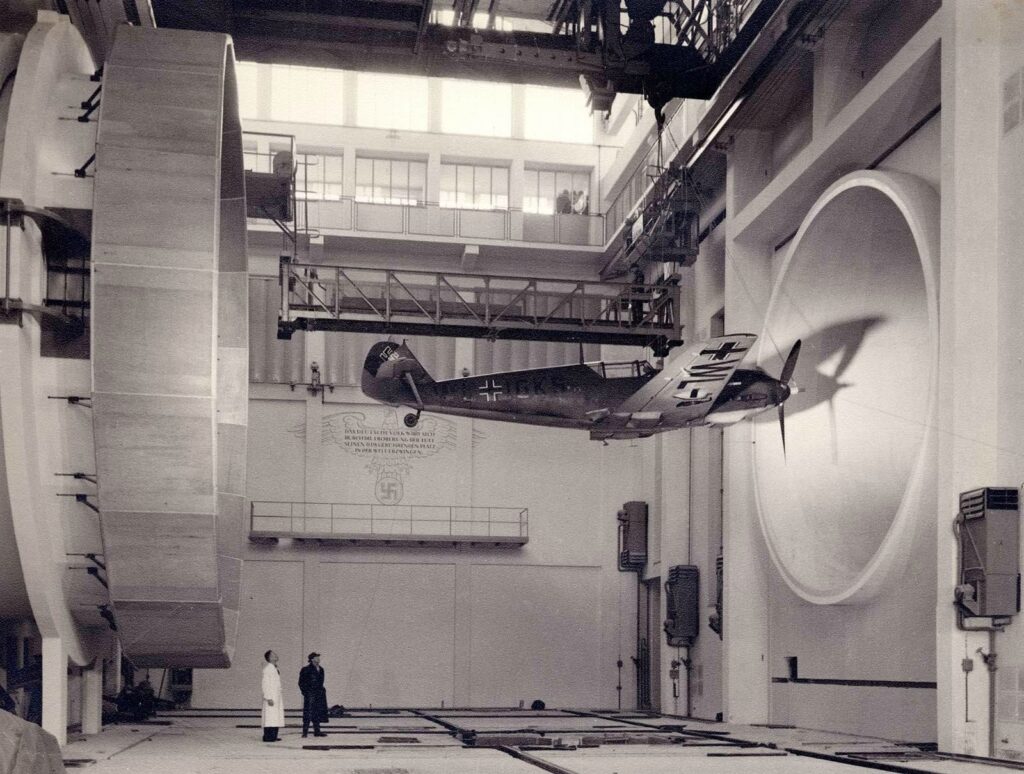

German scientists testing a Messerschmitt Bf 109, 1940.
The facility is the Luftfahrtforschungsanstalt Hermann Goering. It was located in Volkenrode, a suburb of Braunschweig and it was the most advanced wind tunnel test facility in the world at the time, though they were never able to fully calibrate most of the equipment due to the war.
The motto on the eagle behind the plane says: “Das deutsche Volk wird sich durch die Eroberung der Luft seinen ihm gebührenden Platz in der Welt erzwingen”. Translated, it would be: “The German people will, though conquest of the sky, force its duly place in the world“.
The Messerschmitt Bf 109 E3 was designed by Willy Messerschmitt and Walter Rethel and had its first test flight in 1935. The all-metal aircraft had a closed cockpit and a retractable under-carriage.
Powered by a Rolls-Royce Kestrel V engine, it had a maximum speed of 342 mph (550 km/h) and had a range of 410 miles (660 km). It was 28 ft 4 in (8.65 m) long with a wingspan of 32 ft 4 in (9.87 m). The aircraft was armed with 2 machine guns and 2 20 mm cannons.
The first Bf 109As saw service in the Spanish Civil War. By September 1939, the Bf 109 had become the main fighter of the Luftwaffe, replacing the biplane fighters, and was instrumental in gaining air superiority for the Wehrmacht during the Blitzkrieg.
During the Battle of Britain, it was pressed into the role of escort fighter, a role for which it was not originally designed, and it was widely employed as a fighter-bomber as well as a photo-reconnaissance platform.
Despite mixed results over Britain, with the introduction of the improved Bf 109F in early 1941, the type again proved to be an effective fighter during the Invasion of Yugoslavia (where it was used by both sides), the Battle of Crete, Operation Barbarossa, the invasion of the USSR and the Siege of Malta.
More aerial kills were made with the Bf 109 than any other aircraft of World War II. Many of the aerial victories were accomplished against poorly trained and badly organized Soviet forces in 1941 during Operation Barbarossa.
The Soviets lost 21,200 aircraft at this time, about half to combat. If shot down, the Luftwaffe pilots might land or parachute to friendly territory and return to fight again. Later in the War, when Allied victories began to bring the fight closer, and then to German territory, bombing raids supplied plenty of targets for the Luftwaffe.
This unique combination of events led to the highest-ever individual pilot victory scores. One hundred and five Bf 109 pilots were each credited with the destruction of 100 or more enemy aircraft. Thirteen of these men scored more than 200 kills, while two scored more than 300. Altogether, this group of pilots was credited with a total of nearly 15,000 kills.